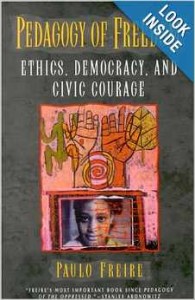
January 6, 2008
Paulo Freire
I am one of 24 co-founders of Earth Intelligence Network, building the EarthGame with inputs from the Transpartisan Policy Institute and the Public Budget Office, and our biggest insight in the past year has been to realize that the 5 billion poor do not have 18 years to go to school; but that they can be taught orally, one cell call at a time, by 100 million volunteers with Internet access and Skype. We simply have to distribute free cell phones in order to help the five billion create stabilizing wealth.
It was therefore for me personally, at the age of 55, a true joy to run across both this book and Pedagogy of the Oppressed as well as Teaching to Transgress: Education as the Practice of Freedom both of which I will review shortly.
The only two books coming close in my own reading history, apart from Chomsky, Ellul, and Marcuse, have been Radical Man: The Process of Psycho-Social Development. and Improper behavior. See also Rule by Secrecy: The Hidden History That Connects the Trilateral Commission, the Freemasons, and the Great Pyramids and Animal Farm (Signet Classics).
The translator tells us that Friere opposed the movement of gaduate studies in education toward atomization, fragmentation, and a false science, “scientism.” The translator is *damning* of the Harvard Graduate School of Education, and I believe all that he says.
The translator emphasizes that across Friere's works, he condemns false claims of neutrality and objectivity, and says clearly that education is an ethical calling that has a strong need to take a stand on what is good and right.
All three of my children have rejected rote learning, even as taught in the best public school district in America, and I am deeply sympathetic with this author's views that teaching should not be about the transfer of old knowledge but rather about the interactive sharing in learning to create new knowledge. Team leaning, learning to learn, open books testing–that is the way to go, in my view. See also Edutopia: Success Stories for Learning in the Digital Age.
We learn that Friere's first book, to set this one in context, taught that education is “that specifically human act of intervention in the world.”
I completely agree when it is stated that the transformation of education must be the foundation for the transformation of all else.
I copy a note “Education *makes* history” (as opposed to losing it).
Note from the book: Democracy from below. Human liberation. Educators inspire rather than shape. See The Tao of Democracy: Using Co-Intelligence to Create a World That Works for All.
The book emphasizes that the study of the oppressed has been squelched by those in authority, inclusive of higher graduate education studies, as an ideological act that declines to recognize that the oppressed are in fact, OPPRESSED, not just poor, lazy, stupid, or otherwise self-condemned.
Note: Curiosity + education + humanity = infinite power.” See A Power Governments Cannot Suppress.
Friere repeatedly returns to a key point, that thinking is an act of communication, and can only take place interactively. Teaching and research should comprise an endless cycle and not be a one-way street (didactic is a fancy word for “I talk, you listen.”)
Progressive teaching respects students and favors student autonomhy. As best I can tell, Evergreen College in Washington State is the gold standard for this kind of teaching.
Friere tells us that teachers who impose no standards, no discipline, are just as bad as teachers who are authoritarian and leave no room for student autonomy or curiosity.
Friere tells us that teachers must apprehend and comprend reality, and not seek to condition students into accepting their poor conditions (or corrupt governances–see Earth Intelligence Network for a range for free offerings on reality).
Friere states firmly that “RealPolitic” is inhumane and wrong. See The Health of Nations: Society and Law beyond the State.
The book closes with an elegant discussion of how education leads to decision-making that is aware and conscientious. I have long advocated the need for public intelligence, and for a relationship between how we learn and how we decide. “Intelligence” is about decision-support, not about spying.
My final two notes from this superb book:
1) To accept and respect differences (i.e. diversity) is essential to listening and learning.
2) Globalization (when combined with 44 dictators and the global class war) is oppressive in its ignorance (or concealment) of the human cost, the cost to humanity.



